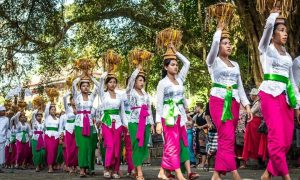Indonesia, a country of more than 17,000 islands, attracts people not only for its rich natural beauty, but also for its multiculturalism and friendly people who have becomeIndonesia Immigrationof popular choices. However.immigrantsComing to Indonesia is not just about a change of living environment, it is also about integrating into a whole new society and culture. In this article, we will provide you with practical tips on food, language, etiquette, festivals and community interactions to help you better integrate into Indonesian life.
I. Understanding Indonesia's cultural diversity
1. Ethnic and linguistic diversity
Indonesia is a multi-ethnic and multi-cultural country, mainly composed of Javanese, Sundanese, Balinese, etc. The official language is Bahasa Indonesia (Indonesian). Although Bahasa Indonesia is the lingua franca, there are many local dialects in various regions, such as Javanese and Balinese.
2. Religious beliefs and values
Indonesia has the largest Muslim population in the world, but other religions, such as Christianity, Hinduism and Buddhism, also have a place. Respect for religious beliefs is an important prerequisite for integration into Indonesian society. For example, in the Muslim community, it is important to be aware of eating habits and dress requirements during Ramadan.
II. Learning basic Indonesian
Language is the bridge to integrating into local life. While many Indonesians can speak simple English, having a basic command of the language will make it easier for you to communicate with locals and demonstrate your willingness to integrate.
Practical expression:
- greetings
- Good morning: Selamat pagi
- Good evening: Selamat malam
- everyday words
- Thank you: Terima kasih
- You're welcome: sama-sama
- How much: Berapa harganya?
- I don't understand: Saya tidak mengerti
Learning Pathways:
- online course: Indonesian language courses are offered by organizations such as Duolingo or Babbel.
- verbal communication: Participate in language exchange programs or join an Indonesian language study group.
III. Respecting and adapting to local etiquette
1. Greetings
Indonesians usually greet each other with a handshake and a smile, taking care to avoid shaking hands too hard. If the person is a Muslim woman, wait for her to offer her hand as a sign of respect.
2. social graces
- call sb. by name:: The use of "Bapak" (Mr.) or "Ibu" (Ms.) as a sign of respect.
- Hand over items with your right hand: The left hand is considered unclean.
3. food culture
At Indonesian family gatherings, hosts often serve diverse traditional dishes such as satay, rendang curry, and chow mein. As a guest, it is polite to accept the invitation and show appreciation for the food.
IV. Participation in local festivals
1. Ramadan and Eid al-Fitr (Idul Fitri)
During Ramadan, Muslims fast during the day and break fast at night. Eid al-Fitr is one of the biggest festivals in Indonesia and it has become a tradition for families to get together and give each other gifts. If you are invited to a festive gathering, you may want to bring some small gifts to show your appreciation.
2. New Year (Nyepi) in Bali
The Balinese New Year is a special holiday where the island goes into silent mode and no one goes out on the day. This is a unique opportunity to experience Balinese culture, but the essentials need to be prepared in advance.

3. National Independence Day (August 17)
Participating in Indonesia's Independence Day celebrations, such as flag-raising ceremonies and community games, will help you quickly integrate into your neighborhood.
V. Adapting to the local pace of life
1. Transportation
- motorcycling: The main mode of transportation in Indonesia is the motorcycle. Learning to ride a motorcycle, or using online taxi services such as Gojek and Grab, can make traveling easier.
- Avoid rush hour: Especially in Jakarta, traffic congestion is very bad, so try to arrange travel during off-peak hours.
2. everyday shopping
- traditional market: Try shopping at the local market, haggling with stallholders is a great way to improve interaction.
- Supermarkets and convenience stores: Supermarkets in Indonesia such as Indomaret and Alfamart offer a wide range of goods, making it easy for immigrants to adapt quickly to life.
3. cost of living
The cost of living in Indonesia is relatively low, with US$500-US$1,000 per month sufficient to cover the basic living expenses of an average family.

VI. Connecting with communities
1. Participation in community activities
Joining a local neighborhood association (RT/RW) or volunteering is a great way to get involved in your community. For example, community clean-up days or holiday celebrations provide opportunities to interact with neighbors.
2. make friends
Indonesians are friendly and welcoming, and building friendships with locals can help you adapt to your new life faster. Being active in social events or classes will not only expand your circle of friends, but also give you a deeper understanding of Indonesian culture.
3. Keep an open mind
When faced with different customs and cultures, remaining curious and tolerant, and being willing to try new things, can make your path to integration smoother.
VII. Tips for Living in Indonesia
- Avoiding cultural taboos: e.g. don't get too close in public and avoid talking about religious or political topics.
- smart clothes: Especially in Muslim areas, it is recommended to dress conservatively to show respect for the local culture.
- Staying green: Indonesia is promoting environmental awareness, minimizing the use of plastics and supporting environmental policies.
concluding remarks
Life as an Indonesian ImmigrantIt is full of opportunities and challenges, but by respecting the culture, learning the language and actively integrating into the community, you will discover the unique charm and warmth of the people. Moving to Indonesia is not only a life change, but also an enriching experience. We hope that the practical tips in this article will help you adapt easily to life in Indonesia and enjoy the colorful life that this beautiful country has to offer!






